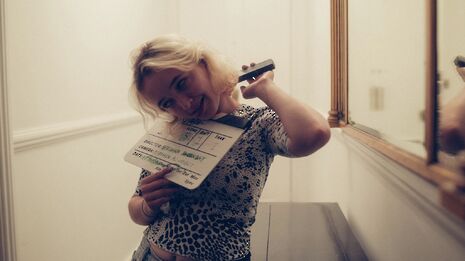Varsity Introducing: Becky Guthrie
Filmmaker Becky Guthrie talks to Elizabeth Howcroft about her experience of making short films in Cambridge and her current project: Dinner Out

How and when did you get involved with film?
It probably started properly when I got to university. I hadn’t made a film before I came to university – apart from the Twilight parody I made on my phone when I was 13! My parents have always had an interest in watching different films so I’d be exposed to all these movies when I was little, like Werner Herzog’s Fitzcarraldo or Wim Wenders’ Wings of Desire – these slightly strange art house films that my parents enjoyed. But I’ve always also had a huge love for fully commercial mainstream things as well. I love Baz Luhrmann’s Strictly Ballroom and big over-the-top camp musicals.
For a bit I wanted to be a fashion designer or a costume designer, I wanted to be an actress for a bit, or an artist, but I was always thinking about worlds and different characters and different situations that these characters could be put in. I’d write down a bit and then never get very far. But I was always watching films throughout.
At Cambridge, I’ve played a jack-of-all trades kind of role. I got to know a couple of people through working on a film called Tachyon and then I worked on another called Prelude. I started going to writers’ meetings and it enabled me to get motivated in writing scripts, so I’ve been trying to churn stuff out pretty regularly since then.
What is Dinner Out about and what inspired you to make it?
Dinner Out is about a young woman attending a surreal dinner party with her aunt and is let in on a dark secret – I’m not going to say any more than that!
The aesthetic is very important. It’s influenced by the 80s-style over-saturated colours that come up in films, it’s influenced by the technicolor films that were coming out in the 50s; it’s got hints of Monty Python-esque kind of thing… A lot of the aesthetic is guided by one cookbook called The Romance of Food by Barbara Cartland. We did some filming at the weekend and managed to get the shots looking like that, which I’m really excited about. It may sound at the moment like it’s much more style over substance and I would agree with that in a way. It’s a film that doesn’t necessarily have to make a huge amount of sense but I want the audience to be excited and interested in the way that it appears on the screen.
Tell me about your unusual approach to hiring a crew.
For this film, the applications were open to female and non-binary people exclusively. I just wanted to do that because, when I was on a film last year, I was sitting with a couple of girls on it and we were wondering why we’d taken on the more secretarial roles – such as producer and script supervisor – why are we not the ones having the creative vision and doing all the creative things? To an extent, on a basic level and within the wider industry, film can seem like more of a boys’ club. There’s this bullshit auteur thing about the ‘auteur’ and how everything comes from their mind, and if you look up ‘auteur’ on Google, it’s just a long list of guys.
I thought it would be nice to have something that would be this anti-boys’ club thing – because girls are just as capable. It’s a really positive environment to be in.
Would you take this approach to hiring a crew in the future?
Yes, definitely! I do believe in having a diversity of voices when collaborating on something creative, though, so maybe for my next project I won’t impose that rule. But, yes, from the time we’ve spent filming on set so far it’s felt really good to be an all-female set, it’s had a positive and chill vibe and I think the general aesthetic that I was going for has something about it – something very ‘camp’ – that the production designers really picked up on. In terms of comparing it to other student shoots I’ve done there haven’t been any on-set memes, which is a huge relief.
 News / Report suggests Cambridge the hardest place to get a first in the country23 January 2026
News / Report suggests Cambridge the hardest place to get a first in the country23 January 2026 News / Reform candidate retracts claim of being Cambridge alum 26 January 2026
News / Reform candidate retracts claim of being Cambridge alum 26 January 2026 News / Cambridge ranks in the top ten for every subject area in 202623 January 2026
News / Cambridge ranks in the top ten for every subject area in 202623 January 2026 Interviews / Lord Leggatt on becoming a Supreme Court Justice21 January 2026
Interviews / Lord Leggatt on becoming a Supreme Court Justice21 January 2026 Comment / Cambridge has already become complacent on class23 January 2026
Comment / Cambridge has already become complacent on class23 January 2026









